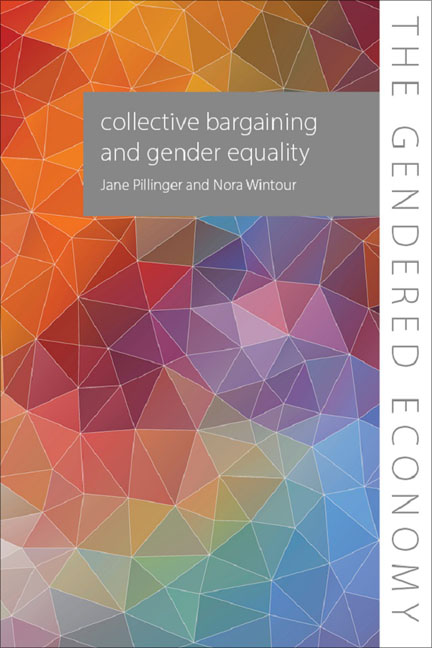Book contents
- Frontmatter
- Dedication
- Contents
- Acknowledgements
- Acronyms
- Foreword
- 1 Introduction
- 2 The gender dimensions of collective bargaining
- 3 Collective bargaining as a tool for gender equality: evidence from across the world
- 4 Changing employment patterns, precarious and informal work, and the challenge for collective bargaining
- 5 The global dimension of collective bargaining: the role of global framework agreements in promoting gender equality
- 6 Conclusion
- References
- Index
4 - Changing employment patterns, precarious and informal work, and the challenge for collective bargaining
Published online by Cambridge University Press: 09 August 2023
- Frontmatter
- Dedication
- Contents
- Acknowledgements
- Acronyms
- Foreword
- 1 Introduction
- 2 The gender dimensions of collective bargaining
- 3 Collective bargaining as a tool for gender equality: evidence from across the world
- 4 Changing employment patterns, precarious and informal work, and the challenge for collective bargaining
- 5 The global dimension of collective bargaining: the role of global framework agreements in promoting gender equality
- 6 Conclusion
- References
- Index
Summary
Over the last decade, following the 2008 global economic crisis, profound changes have taken place in the world of work, particularly affecting women (Bettio et al. 2013). Driven by neoliberal policies and global competition and inequalities, along with technological innovations and shifting patterns of production, there has been a concurrent increase in women’s employment and migration for work, this latter also fuelled in some measure by wars and climate change (Eaton, Schurman & Chen 2017). These changes have major implications for labour regulations, industrial relations and traditional patterns of collective bargaining (ILO 2017a). This section examines these issues in relation to overall patterns of employment and the extent of precarious and informal work, which particularly affects women, in both developed and developing countries.
THE EXTENT OF PREDOMINANTLY FEMALE PRECARIOUS AND INFORMAL WORK
Precarious work (ITUC 2011a, 2017) or non-standard work in the ILO terminology (ILO 2016b) is found in both developing and developed economies. Of countries with available data, three-quarters of the global workforce are employed on temporary or short-term contracts, in informal jobs often without any contract, under own-account arrangements or in unpaid family jobs (ILO 2015b). Over 60 per cent of all workers lack any kind of employment contract. Two billion – or 61.2 per cent – of the world’s employed population aged 15 and over work informally, which includes own-account or contributing family work. Informal economy workers can be employers, employees, own-account workers, contributing family workers and members of informal cooperatives. Emerging and developing countries represent 93 per cent of the world’s informal employment (ILO 2018d). Table 4.1 shows the proportion of informal employment across different regions. Although increasingly common in industrialized countries, the majority of informal work is found in emerging or developing economies. In Sub-Saharan Africa, more than 90 per cent of the female workforce and 82 per cent of the male workforce are employed in informal work (ILO 2018d).
The growth of precarious work globally has major implications for trade union organizing and recruitment strategies, and for the future of existing models of collective bargaining. In an increasingly fragmented labour market, trade unions and strong labour laws have become yet more important.
- Type
- Chapter
- Information
- Collective Bargaining and Gender Equality , pp. 89 - 112Publisher: Agenda PublishingPrint publication year: 2018



